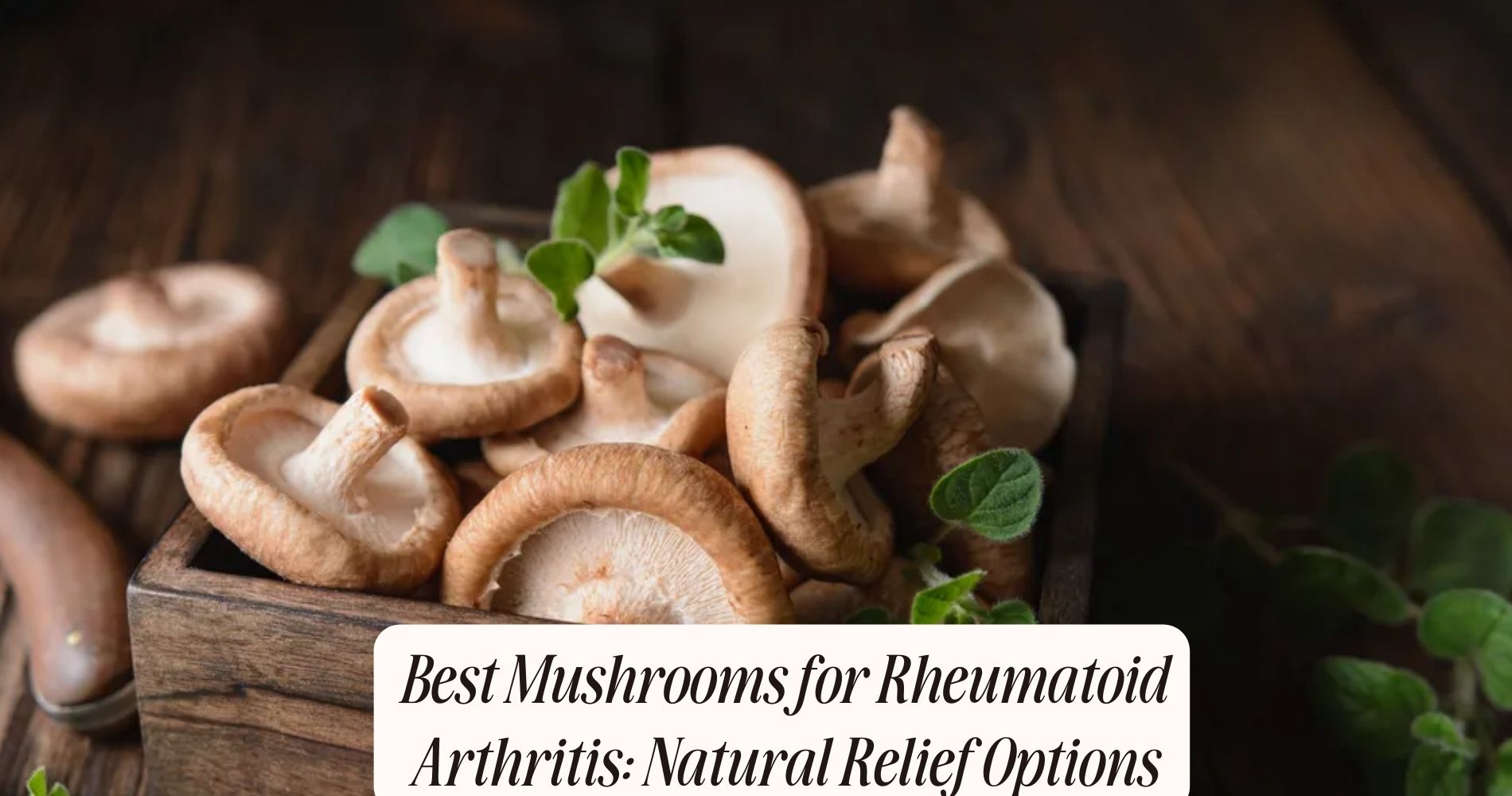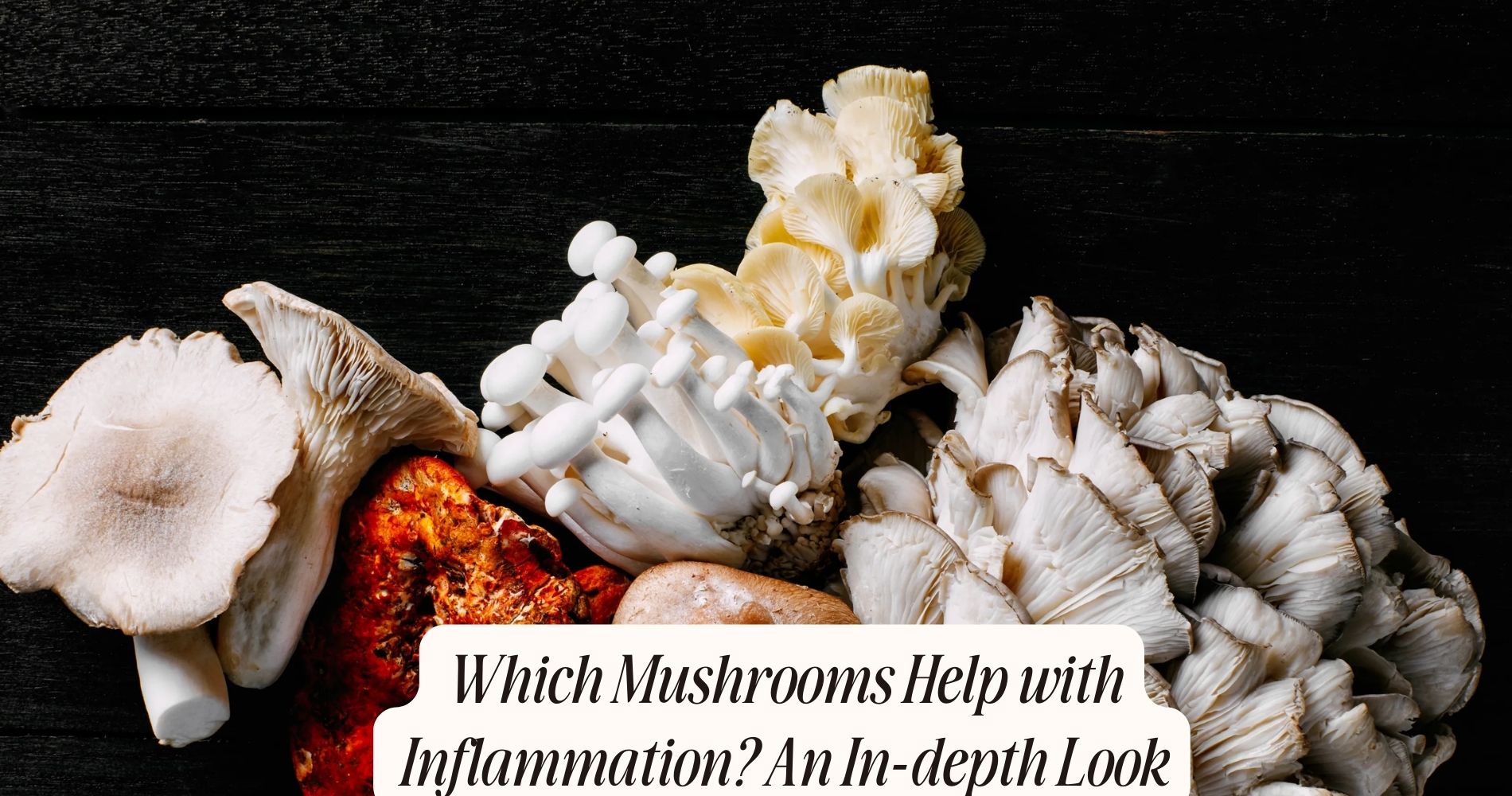
Best Mushrooms for Rheumatoid Arthritis: Natural Relief Options
Reishi
Reishi mushrooms, known scientifically as Ganoderma lucidum, have shown potential in modulating immune responses and reducing inflammation in rheumatoid arthritis. These fungi contain bioactive compounds, such as triterpenoids and polysaccharides, which interact with the immune system to decrease inflammatory cytokines. By inhibiting pro-inflammatory pathways, Reishi can mitigate symptoms associated with rheumatoid arthritis, providing a vital adjunct to conventional treatments.

Reishi supplements are commonly used to harness these benefits. Standardized extracts guarantee consistent dosages of active ingredients, enhancing their therapeutic potential. When considering Reishi supplements, it's essential to verify the product's quality and origin, as cultivation methods can greatly impact the mushroom's efficacy. Reishi cultivation typically involves growing the mushrooms on logs or sawdust substrates, which can influence the concentration of bioactive compounds. Controlled cultivation conditions, such as temperature and humidity, are meticulously managed to optimize the yield and potency of these therapeutic ingredients.
Clinical studies have supported the anti-inflammatory and immunomodulatory effects of Reishi mushrooms, making them a promising option for those seeking alternative treatments for rheumatoid arthritis. Incorporating Reishi into your regimen, under professional guidance, could offer a complementary approach to managing autoimmune conditions.
Shiitake
Shiitake mushrooms possess notable anti-inflammatory properties, which can mitigate joint inflammation in rheumatoid arthritis.
You'll also find that they bolster immune system function through their bioactive compounds, such as lentinan.
Evidence suggests these mechanisms collectively contribute to symptom relief and improved disease management.
Anti-Inflammatory Properties
Frequently researched, the anti-inflammatory properties of Shiitake mushrooms have shown potential benefits for individuals with rheumatoid arthritis. Incorporating Shiitake into your dietary habits could aid in pain management due to their bioactive compounds such as polysaccharides, terpenoids, and sterols. These compounds have demonstrated the ability to modulate inflammatory pathways, possibly reducing the cytokine levels that contribute to the chronic inflammation seen in rheumatoid arthritis.
Clinical studies have highlighted that Shiitake mushrooms contain lentinan, a polysaccharide that exhibits significant anti-inflammatory effects. These effects can help alleviate joint swelling and stiffness, common symptoms associated with rheumatoid arthritis. Additionally, the anti-inflammatory properties of Shiitake can enhance the overall quality of life by potentially decreasing the reliance on pharmaceutical interventions, which often come with adverse side effects.
Incorporating Shiitake mushrooms into your diet is straightforward. You can include them in soups, salads, or as a meat substitute in various dishes. Regular consumption could promote better pain management and potentially reduce the frequency and severity of rheumatoid arthritis flare-ups.
Always consult with your healthcare provider before making any significant changes to your dietary habits, particularly when managing a chronic condition like rheumatoid arthritis.
Immune System Support
Among the numerous benefits, including Shiitake mushrooms in your diet can greatly enhance immune system function due to their rich profile of bioactive compounds such as polysaccharides and beta-glucans. These compounds are known to play a significant role in immune modulation, contributing to an optimized immune response.
Specifically, beta-glucans stimulate macrophages, dendritic cells, and natural killer cells, which are pivotal in recognizing and eliminating pathogenic threats.

Clinical research supports the immune-boosting properties of Shiitake mushrooms. A study published in the Journal of the American College of Nutrition found that participants who consumed Shiitake mushrooms daily exhibited enhanced immune markers and reduced inflammatory cytokines. This indicates that the dietary inclusion of Shiitake mushrooms can lead to a more balanced immune system, which is particularly beneficial for individuals with autoimmune conditions like rheumatoid arthritis.
Incorporating Shiitake mushrooms into your diet can be straightforward. They're versatile and can be added to soups, stir-fries, and salads. By doing so, you're not just making a culinary choice but also a strategic health decision aimed at bolstering your immune system and potentially alleviating symptoms of rheumatoid arthritis through improved immune regulation.
Lion's Mane
Lion's Mane (Hericium erinaceus) exhibits potential therapeutic effects for managing rheumatoid arthritis symptoms through its anti-inflammatory and neuroprotective properties. Clinical research indicates that Lion's Mane may have a notable impact on cognitive health and promote nerve regeneration. The bioactive compounds, hericenones and erinacines, present in Lion's Mane stimulate the synthesis of nerve growth factor (NGF), which is important for the maintenance and survival of neurons. This neuroprotective action is particularly relevant for rheumatoid arthritis patients experiencing cognitive decline due to chronic inflammation.
Moreover, the anti-inflammatory properties of Lion's Mane can help mitigate joint inflammation, a hallmark of rheumatoid arthritis. By modulating pro-inflammatory cytokines, Lion's Mane helps reduce the systemic inflammation that exacerbates this condition. Studies have shown that the mushroom's polysaccharides also play an essential role in immune regulation, enhancing the body's resilience against autoimmune responses, characteristic of rheumatoid arthritis.

Utilizing Lion's Mane as a supplementary intervention may offer a dual benefit—alleviating joint pain and improving cognitive function. This makes it a promising adjunct to conventional rheumatoid arthritis treatments. However, always consult with a healthcare provider before integrating any new supplement into your regimen, particularly if you're undergoing treatment for chronic conditions.
Cordyceps
Cordyceps (Cordyceps sinensis) consistently demonstrates significant potential in managing rheumatoid arthritis symptoms through its potent anti-inflammatory and immunomodulatory properties. Studies indicate that Cordyceps can inhibit the production of pro-inflammatory cytokines, which are pivotal in the pathogenesis of rheumatoid arthritis. By modulating the immune response, Cordyceps helps in reducing joint inflammation and pain, thereby improving the quality of life for patients.
When considering Cordyceps dosage, clinical trials suggest an effective range of 1,000 to 3,000 mg per day, divided into two or three doses. However, consulting with a healthcare provider to tailor the dosage to your specific needs, taking into account any concurrent medications or underlying health conditions, is crucial.
Cordyceps sourcing is another critical factor. Authentic Cordyceps sinensis, mainly harvested from the high-altitude regions of Tibet and Nepal, is considered the most efficacious. Due to its scarcity and high cost, many supplements use Cordyceps militaris, a cultivated variant. Be sure to source Cordyceps from reputable suppliers who provide third-party testing to verify the authenticity and purity of the product. This guarantees that you receive a supplement that delivers the full therapeutic benefits needed for managing rheumatoid arthritis.
Maitake
Shifting focus to Maitake (Grifola frondosa), this mushroom exhibits remarkable efficacy in managing rheumatoid arthritis through its potent immunomodulatory and anti-inflammatory properties. Research indicates that Maitake contains beta-glucans, which enhance the immune response by activating macrophages and natural killer cells. This immunomodulation can help reduce the autoimmune activity that exacerbates rheumatoid arthritis symptoms.
From a cultivation perspective, Maitake thrives on hardwood substrates, particularly oak, and can be cultivated using both indoor and outdoor methods. Indoor cultivation typically involves sterilized sawdust blocks inoculated with Maitake spawn, while outdoor cultivation may use hardwood logs. These methods guarantee a consistent and high-quality yield, essential for both therapeutic and culinary uses.

In the culinary domain, Maitake mushrooms are versatile and prized for their rich, umami flavor. They can be incorporated into various dishes, including soups, stir-fries, and salads, offering not only gastronomic delight but also potential health benefits. The bioactive compounds in Maitake could contribute to alleviating inflammation and modulating the immune system, making this mushroom a valuable dietary addition for those managing rheumatoid arthritis.
Turkey Tail
Turkey Tail (Trametes versicolor) demonstrates significant promise in managing rheumatoid arthritis due to its powerful immunomodulatory and anti-inflammatory properties. The polysaccharopeptides (PSP) and polysaccharide-K (PSK) within Turkey Tail have been shown to modulate the immune system, thereby reducing inflammation associated with rheumatoid arthritis. By enhancing the activity of natural killer cells and T-cells, Turkey Tail can help mitigate the autoimmune response that characterizes this condition.
Furthermore, Turkey Tail plays a pivotal role in gut health, which is increasingly recognized as essential in autoimmune conditions like rheumatoid arthritis. The prebiotic fibers in Turkey Tail support the growth of beneficial gut bacteria, fostering a balanced microbiome. A healthy gut microbiota is crucial for regulating immune responses and reducing systemic inflammation.
In addition to its benefits for rheumatoid arthritis, Turkey Tail is also noted for its cancer prevention properties. The bioactive compounds in Turkey Tail, particularly PSK, have been extensively studied for their ability to inhibit tumor growth and enhance the efficacy of conventional cancer treatments.
Chaga
You should consider Chaga for its significant anti-inflammatory properties, which can mitigate rheumatoid arthritis symptoms.
This mushroom also enhances immune system function, potentially reducing flare-ups.
Additionally, Chaga's high antioxidant content helps combat oxidative stress, a key factor in chronic inflammation.
Anti-Inflammatory Properties
Chaga mushrooms exhibit significant anti-inflammatory properties, making them a potential therapeutic option for managing rheumatoid arthritis. The bioactive compounds in Chaga, such as polysaccharides, betulinic acid, and ergosterol peroxide, have been shown to inhibit pro-inflammatory cytokines, including TNF-alpha and IL-6. This inhibition reduces inflammatory responses in synovial joints, providing symptomatic relief.
Incorporating Chaga as part of a regimen of natural remedies can be advantageous due to its minimal side effects compared to traditional pharmaceuticals. You can include Chaga in your diet through various forms such as teas, powders, and extracts. These dietary inclusions can complement conventional treatments and potentially enhance overall efficacy in reducing inflammation.

Evidence from clinical studies underscores the efficacy of Chaga's anti-inflammatory properties. For instance, research indicates that Chaga extracts attenuate oxidative stress markers and inflammatory mediators, which are important in the pathogenesis of rheumatoid arthritis. By integrating Chaga into your dietary plan, you target inflammation at a cellular level, thereby potentially alleviating pain and joint stiffness associated with rheumatoid arthritis.
Adopting Chaga as a natural remedy aligns with evidence-based approaches to manage chronic inflammatory conditions, suggesting a promising adjunctive therapy for rheumatoid arthritis.
Immune System Boost
In addition to its anti-inflammatory properties, Chaga mushrooms are known for their capacity to enhance immune system function by modulating various immune responses. Chaga contains beta-glucans, which can stimulate macrophage activity and the production of cytokines, thereby fortifying your immune system. Studies have shown that Chaga's polysaccharides can activate immune cells such as T-cells and natural killer cells, which are important for identifying and eliminating pathogens and aberrant cells.
Integrating Chaga mushrooms into your diet can be a strategic lifestyle change for managing rheumatoid arthritis. You can consume Chaga in various forms, such as teas, tinctures, or supplements, making it easier to incorporate into your daily routine. Consistent consumption may contribute to a more balanced and resilient immune system, potentially mitigating the autoimmune responses characteristic of rheumatoid arthritis.
It's essential to consult healthcare providers before making any significant diet changes, especially when dealing with autoimmune conditions. Clinical evidence supports the role of Chaga in immune modulation, but individual results can vary.
Adopting Chaga as part of a well-rounded treatment plan that includes medical advice, proper diet integration, and other lifestyle changes can offer a holistic approach to managing rheumatoid arthritis.
Antioxidant Benefits
Numerous studies have demonstrated that the potent antioxidant properties of Chaga mushrooms can mitigate oxidative stress, a key element in rheumatoid arthritis pathogenesis.
When you consume Chaga mushrooms, their high antioxidant content helps neutralize free radicals, thereby reducing the cellular damage they cause. This process is vital for those with rheumatoid arthritis, as oxidative stress exacerbates inflammation and joint degradation.
Chaga mushrooms are rich in superoxide dismutase and other antioxidant enzymes that play a significant role in combating oxidative stress. By decreasing the levels of reactive oxygen species (ROS), Chaga mushrooms help slow the progression of rheumatoid arthritis.
You'll find that these antioxidants not only protect your cells from oxidative damage but also improve your immune response to inflammatory triggers.
The polysaccharides present in Chaga further enhance its antioxidant capabilities. These bioactive compounds work synergistically to reduce oxidative stress and bolster your body's natural defenses.
As a result, incorporating Chaga mushrooms into your diet can provide a multifaceted approach to managing rheumatoid arthritis symptoms. By targeting the oxidative stress pathway, Chaga mushrooms offer a promising natural intervention for mitigating the debilitating effects of this autoimmune condition.
Oyster
Oyster mushrooms (Pleurotus ostreatus) exhibit anti-inflammatory properties that may be beneficial in managing symptoms of rheumatoid arthritis. These mushrooms contain bioactive compounds such as polysaccharides, glycoproteins, and ergothioneine, which have demonstrated significant anti-inflammatory effects in various studies. By reducing the production of pro-inflammatory cytokines, oyster mushrooms can potentially help mitigate joint inflammation and pain associated with rheumatoid arthritis.
From a culinary perspective, oyster mushrooms offer versatile cooking methods and culinary uses that make them easy to incorporate into your diet. You can sauté, grill, roast, or even stir-fry them to retain their nutritional benefits while enhancing their flavor. Additionally, they work well in soups, stews, and pasta dishes, allowing you to create delicious, arthritis-friendly meals.
Research suggests that regular consumption of oyster mushrooms could contribute to improved joint health and symptom management. Integrating these mushrooms into your diet not only provides anti-inflammatory benefits but also offers a rich source of essential nutrients like B vitamins, potassium, and selenium.
Frequently Asked Questions
How Do Mushrooms Benefit People With Rheumatoid Arthritis?
Mushrooms benefit you with rheumatoid arthritis through their anti-inflammatory properties, reducing joint inflammation. They also offer immune modulation, adjusting your immune response to decrease autoimmune attacks, which could potentially alleviate symptoms and improve overall joint health.
Are There Any Side Effects of Using Mushrooms for Arthritis?
When using mushrooms for arthritis, you might experience possible allergies or digestive issues. Clinical evidence suggests that while generally safe, individual responses can vary. Monitor your symptoms closely and consult your healthcare provider for personalized advice.
Can Mushrooms Interact With Arthritis Medications?
Yes, mushrooms can interact with arthritis medications. You should evaluate medicinal interactions and consider dietary implications. Always consult your healthcare provider to confirm that adding mushrooms won't interfere with your current treatment regimen.
What Is the Recommended Dosage of Medicinal Mushrooms for Arthritis?
For arthritis, you should take medicinal mushrooms daily. Dosage frequency is typically once or twice per day. Dosage timing depends on the specific mushroom, but morning and evening doses are commonly recommended. Consult your healthcare provider for personalization.
Are There Specific Mushroom Supplements for Rheumatoid Arthritis?
Yes, there are specific mushroom supplements for rheumatoid arthritis. Research highlights Reishi, Cordyceps, and Shiitake as beneficial mushroom types. Notable supplement brands include Host Defense and Real Mushrooms, known for their high-quality formulations.
Conclusion
Incorporating medicinal mushrooms like Reishi, Shiitake, Lion's Mane, Cordyceps, Maitake, Turkey Tail, Chaga, and Oyster into your regimen can provide substantial relief for rheumatoid arthritis symptoms. These fungi possess anti-inflammatory, immunomodulating, and antioxidant properties, which can mitigate joint pain and enhance overall wellness.
While these natural options show promise, consult with your healthcare provider to confirm their compatibility with your existing treatment plan. Evidence supports their efficacy, but personalized medical advice remains paramount.




